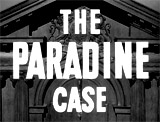
|
The Paradine Case (1947)
In Hitchcock's film noirish, stagy courtroom drama
- based upon the 1933 novel by Robert Smythe Hichens; it was a very dialogue-rich
and slow-moving tale, and was noted as Alfred Hitchcock's final
film for producer David Selznick.
The Hitchcockian tale of romantic
obsession shared similarities with the director's later masterpiece Vertigo
(1958) about a smitten lawyer who self-destructively fell
in love with his alluring female client. It also contrasted the two
clearly opposite females in the film - a married, rational, optimistic
and mature blonde, and a dark-haired, elegant, foreign-born, strikingly-beautiful
and sophisticated suspected murderess.
The film's main character was an
attractive, exotic, classically glamorous and poisonous femme
fatale - a seductive nymphomaniacal, widowed adulteress who was responsible
for the deaths of two men and the near destruction of another.
- during the opening sequence, Mrs. Maddalena Anna
Paradine (Alida Valli in her first Hollywood role) was introduced; in "the
recent past," the beautiful Italian widow was living in London;
she was charged by the London police with poisoning her older, blind, physically-disabled,
and retired WWI war-hero husband Colonel Richard Patrick Paradine on
May 6, 1946; she admitted that she had only become wealthy after marrying Paradine
- the Paradine family's solicitor,
Sir Simon Flaquer (Charles Coburn), hired one of his colleagues
- respected and distinguished barrister Anthony "Tony" Keane
(Gregory Peck) to defend Mrs. Paradine; he had a reputation for
not always defending the wealthy class; Keane had been married
for 11 years to pretty, sympathetic, devoted and kind-hearted blonde wife Gay (Ann Todd)
- in regards to the case,
Keane's wife Gay offered her opinion about the female defendant: "I
don't believe she did it...Well, nice people don’t go about
murdering other nice people....And anyone who wasn't nice wouldn't
have married that poor blind man." Tony retorted that she was
delusional about nice people: "So it's your opinion that nice
people never murder their husbands?"; Gay was concerned that
the time-consuming case would interfere with their lives; shortly
later, they spoke about how their planned anniversary trip to Switzerland
(possibly changed to Italy after Tony met the Italian widow) would
be affected by the trial
- when visited by Keane in the foreboding and
sparse H.M. (Holloway) prison while awaiting trial,
the glamorous Mrs. Paradine was described as "a strange woman,
with an almost mystic calm"; she expressed worry that people would
pre-judge her as a gold-digging female who married her helpless
blind husband in order to kill him for an inheritance: ("Saying
I married a helpless blind man for his money and then killed him for money")
- the already-infatuated Keane immediately denied her guilt, took her side and fantasized
that as a beautiful woman, she had sacrificed so much in marrying
a blind man: "Weren't you his eyes?...You devoted your whole
life to this splendid fellow. Freely. Gladly.... It was a sacrifice.
A sublime sacrifice"; shortly later, solicitor Simon Flaquer's daughter
Judy (Joan Tetzel) predicted about Keane: "Can't you just see
Tony giving another one of his great performances. Riding to the
rescue of beauty in distress"; later, Keane described Anna as "strangely
attractive"
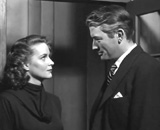
|
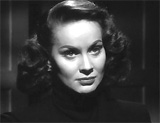
|
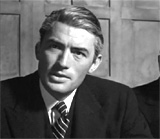
|
|
Anthony "Tony" Keane with His Client
Mrs. Paradine in Prison Before Trial
|
- during his interactions with his attractive client,
trial lawyer Keane soon became blinded,
bewitched and obsessed by Anna himself, and came under her spell;
he learned that she had been promiscuous (a woman of easy virtue),
and a victimizer of men before and during her marriage: ("It
will not shock you, I assume, to learn that I am a woman, what
would you say, a woman who has seen a great deal of life"),
a fact that she had shared with her husband: ("I kept nothing
from him"); to Keane's surprise, she confessed that she had
taken advantage of the older, rich, married and respected man when
she was a teenager - and there were many others
- a discussion ensued between Flaquer and Keane about how difficult it
would be to defend Anna in a case involving a blind man committing
suicide on his own; there was mention of the Colonel being possibly
assisted in his death by his mysterious but devoted and trusted 30
year-old Canadian valet André LaTour (Louis Jourdan) of
many years; Flaquer stated his strong beliefs: "This wasn't
suicide, and it wasn't assisted suicide, it was murder"; Flaquer
firmly believed Mrs. Paradine was guilty
- blinded to the evidence, Keane felt otherwise
and wanted her to plead not-guilty: "We
have the very simple and very obvious fact that Mrs. Paradine is
not a murderess - she's too fine a woman"; Flaquer disagreed: "Indeed?
I was of the impression that she'd been a woman of very low estate
and rather easy virtue"; the distinguished but bewitched and
enraptured trial lawyer Keane unquestioningly believed Anna's innocence
from the start, although she was obviously guilty; he believed he
would be nobly defending her virtue: "I intend that the
rest of the world shall see her as I do, as a noble,
self- sacrificing human being that any man would be proud of"
- overly-dedicated and lustful toward Anna himself, Keane was determined to indict
Andre LaTour as Anna's scapegoat - believing he was guilty of the
crime instead of Anna; he suspected that "there's something
between Mrs. Paradine and that valet"
- turning 'detective' in the case, Keane visited the Paradine country estate
known as Hindley Hall in Cumberland (the Lake District), in order
to interview LaTour and "nose around a bit";
he discovered the estate was up for rent now that it
was vacated; he suspected rumors circulating that LaTour might have
been Anna's lover - when he learned that LaTour lived in the house,
not the servant's quarters
- during a late night encounter with
LaTour, Keane was told that the manservant believed Anna was evil
and that he despised her - to his surprise: "How
can you know her? If you did, I should not need to tell you that
only Almighty God or the Black Devil himself knows what's going on
in that head of hers....What I say is true. I know her. And I will
tell you one thing more. I will tell you about Mrs. Paradine. She's
bad, bad to the bone. If ever there was an evil woman, she is one"
- upon his return to London,
Keane visited Anna in prison and told her LaTour's resentful assessment
of her: "LaTour hates you. You know that? He hates you most bitterly. He said, he said
you're an evil woman"; he then asked: "What existed between
you and LaTour?" but received an unsatisfactory answer; after he became exasperated
by her, she asked him to drop the case; he softened, asked for forgiveness,
and then vowed to defend her: "I shall do my best to defend you"
- although Keane was considering
dropping the case, his wife Gay continued to support
her husband's work on the case; when he returned from the Lake
District, she reinforced her earlier vow to be supportive: ("Do
you think I-I could ever want anything bad for you?"), and
urged him to find the enigmatic Anna innocent; she reasoned that
she didn't want to lose her infatuated husband if Anna was executed
- she knew that he would be emotionally devastated by her loss,
and it would affect his future career. She told him: "It's
not easy to face the thought of losing you. We've been really married,
really truly married as few people have been. Yes, I've lain awake
alone, night after night, and I've been tempted to pray that she
- but I've come to a conclusion, Tony. I want her to live. I want
very much for her to live. And I hope she gets free, scot free.
Free to kill. Or, to take other wives' husbands or do anything
else that comes into that beautiful head of hers.... I care very
much (what happens to her), not for any noble reason. I do hate
her, but because I want all this business over and done with, and
an end to your being all mixed up, part lawyer, part lover....alright,
frustrated lover, then. Yes, and part husband still"
- Keane's wife Gay also expressed her feeling that
their love wouldn't survive if he lost the case: "All
I ask is that she lives so the fight can be an even one. Because,
if she dies, you're lost to me forever. I know you'd go on thinking
that you love her. You'll go on imagining her as your great lost
love....You don't love her, no, you don't. I may not be the cleverest
woman in the world, and there are lots of things I don't know.
But there's one thing I know better than anyone else. I know you.....I
don't want you to say anything, but I do ask you for the most brilliant
job of your career. I want you to win this case. I want you to get her free"
- Mrs. Paradine was put on trial in London in the
Old Bailey Courthouse, autocratically and tyranically ruled over
by offensive, lecherous presiding Judge Lord Thomas Horfield (Charles
Laughton); she pleaded not guilty to the charge of murdering her
husband on May 6th, by administering poison in a glass of burgundy
brought with his dinner into his bedroom, according to the Crown's
Chief Prosecutor Sir Joseph Farrell (Leo G. Carroll); he contended
that the defendant was inordinately patient: "Heaven knows
what sultry fires were banked within. It would've been a considerable
strain to any ordinary woman, no doubt. But this woman, the prosecution
contends, is no ordinary woman. She had patience. She could wait.
This was indeed no ordinary woman"
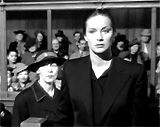
Mrs. Paradine's Entry into Courtroom Trial
|
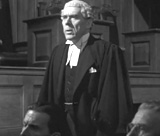
Chief Prosecutor Sir Joseph Farrell (Leo G. Carroll)
|
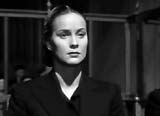
|

|
|
Mrs. Paradine On Trial
|
- during the trial's examination of LaTour by Keane,
Keane was able to discredit or question the truthfulness of some
of LaTour's testimony; it was called into question whether Mrs. Paradine
invented a story or not about LaTour being discharged and told to
leave the Colonel, causing a quarrel; LaTour also confessed that
he had poisoned the Colonel's sick old hunting dog two years earlier
(with a single dose of poison from the vet), but denied being involved
in the Colonel's death
- in a break during the trial, Anna was upset that
Keane suspected LaTour of murder, and she defended his innocence: ("I
objected when you wanted to make it appear that Andre had helped
my husband kill himself. I objected even to that. And now you make
him out to be a murderer...I will not have you making Andre a murderer");
Keane was shocked by her denouncement of his heroic efforts, and
then privately admitted his love for his client - something that
compromised his judgment and impartiality: ("I was idiot enough
to fall in love with you").; and then she made a startling accusation: "You're
my lawyer, not my lover"; she made it clear that she didn't
want him to bring down LaTour with his line of questioning: "You
are not to destroy him. If you do, I shall hate you as I've never
hated a man"
- the trial eventually revealed during further testimony that LaTour was indeed Anna's
secret adulterous lover and was having a secret affair with her
- possible motivation for the original murder of the husband; LaTour
attempted to shift blame: "It was she who dragged us both down. I hated every moment with her, but God
forgive me, I couldn't help myself!"
- when Keane began his defense of Anna before calling
her to the stand, he again stressed the point about Anna's sacrificial
marriage: "A sacrifice made cheerfully by a beautiful woman while still fascinating,
and still young, in order to bring the light of her affection into
the darkness of a blinded man's life"
- as a witness, Anna explained her reasoning for the
possibility of LaTour's dismissal by the Colonel during a quarrel;
according to her, LaTour had become "too familiar" with
her and was forcing himself on her sexually: ("He - he took
liberties")
- although she dubiously asserted that she resisted him and complained
to her husband about it; then, she further
implicated herself in her husband's death (to provide a cover-up
of LaTour's guilt), by admitting that she (not LaTour) had washed
and dried the burgundy wine glass that contained the poison; with
that bombshell admission, the case was adjourned until the next
day
- once Keane's strategy to
condemn LaTour (and therefore save Anna) ultimately backfired,
he became very disillusioned about the case; after testifying to
his own guilt about the affair (but not admitting to poisoning
the Colonel), LaTour (who felt tremendous pressure on the stand)
killed himself; the next day, the sensational news was announced
in court by Sir Flaquer: ("...the witness LaTour has done
away with himself"); Keane immediately concluded that LaTour
had killed himself because he had betrayed his master
- after the news of LaTour's unnecessary death, Mrs.
Paradine was both furious and completely distraught and shaken;
she confessed to her guilt - that she had poisoned her husband because of her
lustful desire for LaTour: ("The man I love is dead").
It was confirmed that the seductive Anna had succeeded in inducing
LaTour to make love to her, even though it tore him up inside;
she wanted to run away with him to be free and live together,
but LaTour declined because of his honor; he had come to hate her
for betraying his Colonel; Mrs. Paradine's admission was
devastating: "Andre knew I killed the blind
man. Andre knew it. I didn't tell him, but he knew it"
- although Keane tried to control her admissions of guilt and self-incrimination,
she responded: "I have nothing more
to say to you, Mr. Keane. I loved Andre LaTour - and you murdered
him. My life is finished; it is you yourself who have finished it.
My only comfort is the hatred and contempt I feel for you!"; according
to her, LaTour had no part in the plot to kill the Colonel - she
was entirely responsible for the murder; she also hatefully chastised,
denounced and contemptuously accused the disreputable Keane for his
improper handling of the case, and for his part in destroying her
real love, LaTour, by causing his suicide
- in front of the court, a weakened
and faltering Keane confessed that Anna's words rang true - he
concurred that he had major shortcomings, had made errors of judgment
and incompetence during her defense, and asked for forgiveness
before requesting to be excused from the case in an aborted speech:
("My lord, I regret that I can go on no longer")
- for her crime, Mrs. Paradine was sentenced to execution (by hanging): ("The
Paradine woman will be hanged after three clear Sundays")
- despairing and guilt-ridden, Keane's law practice
and his marriage to Gay were nearly destroyed
from the emotional pressure and stress; he ultimately reconciled
with his conciliatory and supportive wife who vowed to stand by
him: ("I was proud of you today");
Keane felt such public shame that he considered quitting the bar,
but she encouraged him to remain steadfast, strong, and committed
to his work: "The most important moment
in your life is now. My husband is the most brilliant man I've ever
known. You can throw away your career and become a beachcomber if that's
what you want....Oh Darling, don't you understand that I want you back
on the job just as fast as ever you can. And I hope you've a tough
case. Very tough. So that it will take the very best you have. Winning
every verdict you're after"
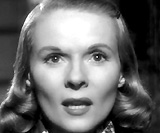
|
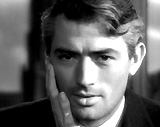
|
|
Keane Reconciled and Supported by His Long-Suffering
Wife
|
|
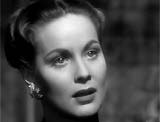

Anna Paradine (Alida Valli) - Receiving News of Her Arrest
for Murder

Defense Lawyer "Tony" Keane (Gregory Peck)
with Wife Gay (Ann Todd)
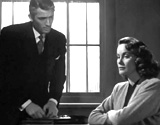
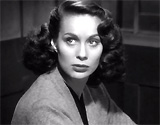
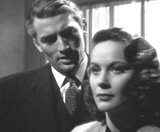
During Preparations For Trial, Keane Grew Closer to Mrs.
Paradine - Leading to Obsession
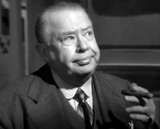
The Beliefs of Solicitor Sir Simon Flaquer (Charles Coburn) - "It
was murder!"
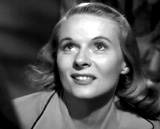
Keane's Long-Suffering Wife Gay
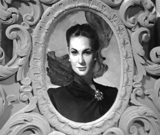
Anna's Portrait Carved into Her Bed's Headboard in the Country Estate
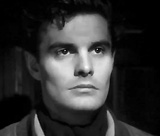
Colonel's Valet Andre LaTour (Louis Jourdan): "She's bad, bad to the bone"
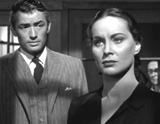
Keane to Anna: "What existed between you and LaTour?"
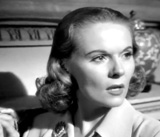
Gay to Keane: "I want very much for her to live..."
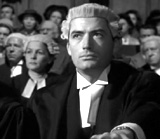
Barrister Anthony Keane
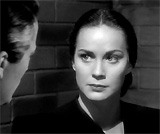
Anna Upset with Keane's Tactics Against LaTour
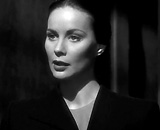
Anna (regarding LaTour): "He - he took liberties!"
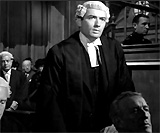
Keane: "Did he try to make love to you?"
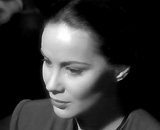
Anna's Confession: "The man I love is dead"
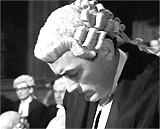
Keane Chastised by Anna for Destroying LaTour - He Confessed His
Shortcomings Before the Court
|



















